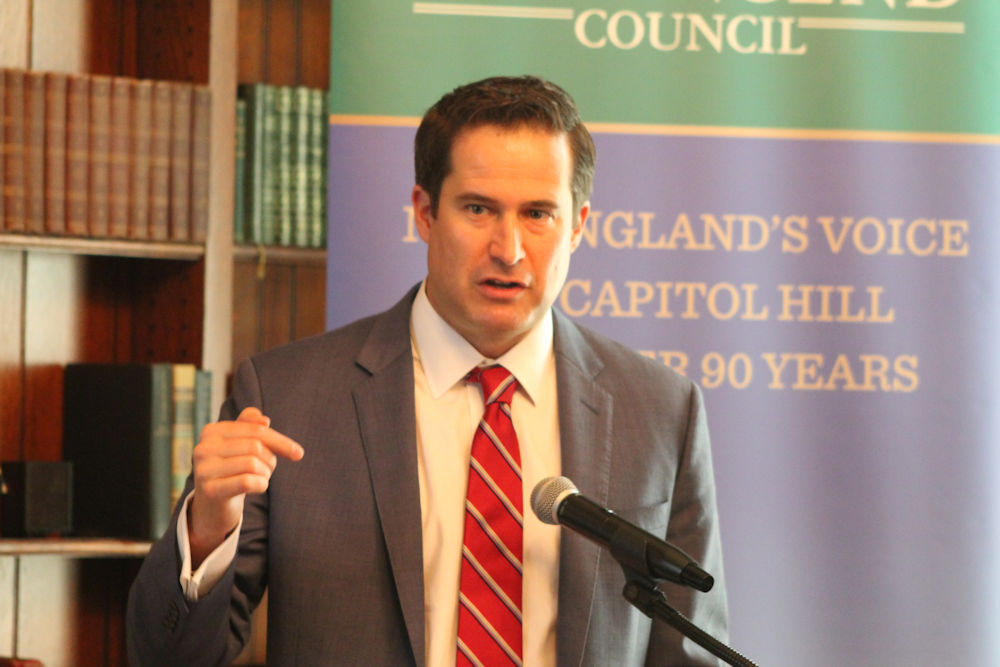
Polling is a snapshot of time; when times change, polls are a time capsule of the way it used to be. Perhaps no one better exemplifies the shifting sands of polls right now than Seth Moulton, who has led the apparently unsuccessful charge to block Nancy Pelosi from returning as Speaker of the House.
The North Shore Congressman has agitated for a change in Democratic leadership since the 2016 election. and for most of the past two years, polls suggest he’s been on solid footing. Pelosi is consistently unpopular in national polls, with favorable ratings typically in the low-30s. That unpopularity is driven by Republicans and Independents. Democrats have tended to have a favorable view of Pelosi, lately by a 2-to-1 margin.
But having a favorable view of someone is not the same thing as thinking they’re right for a job. During and immediately after the election, polls suggested Democratic voters agreed with Moulton that Pelosi should go. A Gallup poll conducted two weeks before election day showed a majority of Democrats (56 percent) would prefer someone other than Pelosi as Speaker.
Voters may have been picking up what Democratic candidates were putting down. Many either ran promising not to vote for her, or were coy about their intentions. This included Massachusetts’ own Ayanna Pressley, who was noncommittal on Pelosi during the campaign. (Her opponent, incumbent Mike Capuano, was on the record calling for a change in leadership.) Even after an August WBUR poll of her district’s primary voters found that only a third wanted Pelosi as Speaker if Democrats won the House, Pressley remained on the fence.
But sometime between the election and now, opinion appears to have shifted. A Morning Consult poll from late November found a majority of Democrats would support Pelosi for Speaker. Differences in question wording may account for some of the shift, but circumstances changed as well. Pelosi was given credit for the Democrats’ strong performance in the midterms. Meanwhile, the opposition failed to coalesce around an alternative. The one floated challenger, Marcia Fudge of Ohio, declined to run after winning a subcommittee chair from leadership. Even South Boston Rep. Steve Lynch, who had signed a letter with Moulton opposing Pelosi, has now shifted to supporting her.
Pressley leveraged her undecided position to extract a promise that gun control will be a top issue, and a position on a gun violence task force. This is an issue close to home – a WBUR poll from March showed nearly 70 percent of registered voters in Massachusetts want lawmakers to prioritize “protecting citizens from gun violence” over “protecting the right to own guns”.
Perhaps these are easy trades for Pelosi to make, but Pressley chose to bide her time and play the game, while Moulton made a stand. He now appears to be on the outside looking in, especially at a time when others in the Massachusetts delegation are ascending to positions of real influence.
If Moulton is looking for an escape from the House, the current polling doesn’t show many options. According to a recent UMass Amherst poll, Moulton would lose a challenge to Senator Ed Markey. Should he go big and throw his hat into the ring for president, he’s currently polling last among a dozen 2020 prospects.
But time marches on, as do the shifting sands of polls…
— Maeve Duggan and Rich Parr
Crosstabs
The Horse Race is visited by a ghost of podcasts past this week, as Lauren Dezenski calls in from Washington to talk Elizabeth Warren and 2020. Plus #mapoli power couple Will Keyser and Eileen O’Connor discuss their success 2018 campaigns for Charlie Baker and Lori Trahan.
ICYMI, last week Steve and Jenn talked to WBUR’s Anthony Brooks about Seth Moulton and Nancy Pelosi, Cambridge State Rep Mike Connolly about ranked choice voting, and Maureen McInerney stops by the discuss the state GOP’s 2018 electoral woes.
And don’t miss Jenn’s exclusive sit-down with the newest member of the Massachusetts Congressional Delegation, Ayanna Pressley.
FiveThirtyEight has Trump with a 42 percent approval rating and a 52 percent disapproval rating.
A recent Harvard (CAPS) and Harris Poll found that in a hypothetical Democratic presidential race, Joe Biden would receive a plurality of the vote at 25 percent, following by Bernie Sanders with 15 percent, then Hillary Clinton with 13 percent. Elizabeth Warren would receive only 4 percent of the vote.
Speaking of Warren, the Boston Globe editorial board urges her to follow Deval Patrick’s lead and not run for president in 2020. Our own Steve Koczela took to twitter to question their logic.
A Morning Consult / Politico poll found that, like most issues, there’s a partisan divide as to how voters view the use of private emails to conduct government business.
